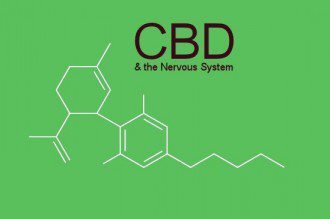By Audrey Lefebvre, RN
Guest Writer for Wake Up World
Cannabidiol (CBD) is an active cannabinoid found in cannabis which, unlike THC (tetrahydrocannabinol), does not produce a psychoactive effect in the brain. For this reason, CBD has become a primary focus of medicinal cannabis studies.
CBD has been found to have a wide range of benefits, including lowering blood sugar levels, promoting bone growth, and importantly, protecting the human brain and nervous system from degeneration.
How CBD Protects the Nervous System
The nervous system is comprised of two main parts: the peripheral nervous system, which includes the nerves and ganglia on the outside of the brain and spinal cord, and the central nervous system, which includes the brain, cranial nerves, spiral cord, etc. CBD prevents the degeneration of the nervous system in several ways.
The human body has a fatty acid called amide hydroxylase (FAAH), an enzyme which and breaks down the neurotransmitter, anandamide, which is associated with the neural generation of motivation and pleasure, as well as neural development in early stage embryos. CBD suppresses the effect of FAAH in the body, creating higher levels of anandamide, which in turn naturally binds to Cannabinoid type 1 receptors (known as CB1), which are concentrated in our central nervous systems.
Additionally, CBD successfully stimulates the release of 2-AG, an endocannabinoid that stimulates both CB1 and Cannabinoid receptor type 2 (known as CB2). These receptors play a key role in regulating mood, memory, appetite, sleep, and reduction of inflammation within the human body. For this reason, topical treatments of CBD can help reduce brain inflammation associated with autoimmune disorders, and which may lead to damage of the neurons’ fatty covering. Reducing inflammation in the brain may also be used to treat neuropathic pain, which is caused by damage to the somatosensory nervous system.
A dosage of 20-40 mg of CBD has also been used to successfully treat high eye pressure, a painful condition caused by elevated levels of fluid in the eye. For this reason, CBD may benefit individuals who are affected by Glaucoma due to intraocular hypertension (high eye pressure), thereby preventing optic nerve damage.
Additional CBD Benefits
CBD has been shown to benefit diabetes patients by naturally lowering the body’s blood sugar level as well as chronic inflammation which increases the development of insulin resistance within the body and type 2 diabetes. In parallel, CBD may lower blood pressure, indirectly assist in the development of bone tissue, and act as a natural antibacterial. CBD has also been show to protect against cancerous cells and tumors. Consequently, CBD is of high interest and is researched for the future treatment of cancer.
CBD Production Challenges and Current Legal Status
Discovered in the 1940s, CBD is a prominent active compound in cannabis. Although CBD’s medicinal benefits have been well studied and documented, nearly 8 decades later this essential ingredient’s full value is still relatively untapped and unrecognized by mainstream medicine.
Despite centuries of use in ancient cultures, there is today a negative connotation around the medical use of cannabis, particularly as the recreational use of cannabis is illegal in many parts of the United States. Still considered a Schedule I drug with “no medicinal value”, it is a controlled substance that is legal in only a hand-full of States (such as Alaska, Colorado, Oregon, and Washington.) However, it is important to note that CBD provides zero psychoactive properties, does not get you “high”, and is not addictive.
Interestingly, CBD (usually found in oil form) is legal in all 50 states as long as it contains less than 0.3% THC, but it is not readily available as the CBD compound needs to be extracted from a plant that is currently prohibited from commercial growth in the United States. However, with a wealth of scientific support for the health benefits of cannabis, and a ground-swell of public pressure to legalize the possession and use of this plant, the U.S. Congress may soon exempt CBD from the definition of cannabis, or decriminalize cannabis entirely.
With so many proven health benefits, reconsideration of the legal status of cannabis and further study into the medicinal uses of CBD and how it protects the nervous system, are critical to the future of medicine.
Sources:
- www.projectcbd.org/how-cbd-works
- www.projectcbd.org/article/cbd-misconceptions
- Giacoppo S, Galuppo M, Pollastro F, Grassi G, Bramanti P, Mazzon E. A new formulation of cannabidiol in cream shows therapeutic effects in a mouse model of experimental autoimmune encephalomyelitis. 2015 Oct 21;23(1):48. doi: 10.1186/s40199-015-0131-8. Daru: Faculty of Faculty of Pharmacy, Tehran University of Medical Sciences. www.ncbi.nlm.nih.gov/pubmed/26489494
- www.wakeup-world.com/2015/05/17/over-100-scientific-studies-agree-cannabis-annihilates-cancer (includes detailed references.)
- www.castilesoap.com/blog/hemp-oil-skin-benefits-n17
- Tomida, I., Azuara-Blanco, A., House, H., Flint, M., Pertwee, R. G., and Robson, P. J. Effect of sublingual application of cannabinoids on intraocular pressure: a pilot study. Journal of Glaucoma. 2006;15(5):349-353 http://www.ncbi.nlm.nih.gov/pubmed/16988594
Related reading:
- The Endocannabinoid System and How THC Kills Cancer
- Cannabis Legalization: The Time Has Come for Evidence-Based Cannabis Policy
- The Chemistry of a Cannabis High: How THC’s Psychoactive Properties Protect the Brain
Further reading from Audrey Lefebvre:
About the author:
Audrey Lefebvre R.N. specializes in Integrative Medicine, incorporating traditional and holistic care. Audrey holds over 5 years of experience in direct patient care and 4 years in the practice of Mind, Body and Spirit Care under the supervision of Dr. Ron Shemesh, M.D.
You can connect with Audrey at:
- Website: castilesoap.com/blog
- Facebook: www.facebook.com/classicsong
- Twitter: twitter.com/castilesoapUSA

If you've ever found value in our articles, we'd greatly appreciate your support by purchasing Mindful Meditation Techniques for Kids - A Practical Guide for Adults to Empower Kids with the Gift of Inner Peace and Resilience for Life.
In the spirit of mindfulness, we encourage you to choose the paperback version. Delve into its pages away from screen glare and notifications, allowing yourself to fully immerse in the transformative practices within. The physical book enriches the learning process and serves as a tangible commitment to mindfulness, easily shared among family and friends.
Over the past few years, Wake Up World has faced significant online censorship, impacting our financial ability to stay online. Instead of soliciting donations, we're exploring win-win solutions with our readers to remain financially viable. Moving into book publishing, we hope to secure ongoing funds to continue our mission. With over 8,500 articles published in the past 13 years, we are committed to keeping our content free and accessible to everyone, without resorting to a paywall.









